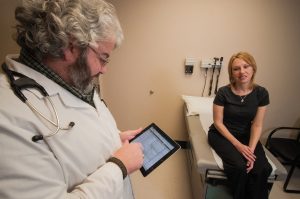You’re sitting in the doctor’s waiting room, jotting down all of your symptoms so you don’t forget them. Let’s see. You’re exhausted. You’ve got embarrassing gas and uncomfortable bloating. Your brain is foggy, you’re depressed, and your skin itches. My, that’s quite a list.
After Googling, you’ve basically decided you have candida overgrowth (or just “candida”)—so you’ll mention that, too. After all, in this age of easy internet research, you could be your own doctor. Right?
Maybe not. Many people (both women and men) conclude they have candida because its symptoms are so nonspecific. All the symptoms you mentioned are, too, so it’s easy to diagnose yourself with the disorder.
So, let’s take a look at what candida is, why some people don’t think it’s a legitimate diagnosis, and whether or not you may actually have it.
What is Candida?
Candida is fungus. Sounds gross, but it’s not: a small amount already lives in your mouth and intestines to aid digestion and nutrient absorption. When your body overproduces it, it breaks down the wall of the intestine and penetrates the bloodstream, releasing toxic byproducts into your body. This overgrowth of candida is widely seen in people with immune problems, like HIV, Crohn’s disease, and ulcerative colitis.
So, why don’t people believe candida is a “thing,” and why is it controversial? Conventional doctors, by and large, believe candida ONLY becomes a problem in those people with immune dysfunction, so they don’t always test for it. A subset of alternative medical doctors, on the other hand, blame candida overgrowth for just about any collection of symptoms. So, what’s the truth about candida?
Yes, Candida is Real.
In short… yes, candida overgrowth is a real thing, but the real question is at what amount? It’s true we all have some in our GI tracts, but health consequences ensue when they grow to higher levels. The “good bugs,” or healthy bacteria, in your gut typically keep your candida levels in check, but a round of antibiotics, stress, or carb-heavy diet can cause the bad bugs to kill the good and take over.
Their attack will likely lead to symptoms, including:
- Brain fog
- Chronic fatigue
- Constipation, or diarrhea
- Depression
- Food sensitivities
- Migraines
- Painful, persistent bloating or gas
- Skin issues
- Weight gain
Like you, many people think they have it because these symptoms are so nonspecific (much like the symptoms of adrenal fatigue). You can have every one of the symptoms and it still may not be candida overgrowth. Often, it’s some other condition caused by multiple problems INCLUDING candida overgrowth. When you have it, it’s connected to autoimmune disease, fatigue, blood sugar dysregulation, weight gain, and potential imbalances in your gut bacteria.
Don’t Go with Your Gut—Get the Testing
While you want to avoid self-diagnosis, it’s important to confirm or rule out candida to avoid going down the wrong path. If you don’t have it and treat it as if you do, you’re subjecting yourself to a super-harsh antimicrobial prescription that can disturb the good bugs in your GI tract. If you do have it and don’t get treatment for it, you can end up with more serious health problems.
Fortunately, a simple stool test is all it takes to identify/diagnose candida overgrowth and many progressive doctors have been using it for years. There’s also an organic acids test, which measures yeast and fungal byproducts produced in the urine. So, if you suspect the condition, request the testing.
Treat it Right
Once you have a diagnosis, you need the guidance of a trained professional to treat it correctly and safely. Instead of going the prescription route, Twin Cities Metabolism may use any combination of the following:
- Supplements and Antimicrobial Herbs—such as caprylic acid, lauric acid (also found in coconut oil), beneficial yeast saccharomyces boulardii, uva ursi, berberine), which are better tolerated than prescription medications.
- Nourishment of Your GI Tract—with good, healthy fermentable fiber sources to encourage good-bacteria growth.
- Probiotics—to keep your gut bugs happy.
If you’re ready to get to the bottom of your health concerns, we’re ready to help you.
We have the candida tests and customized treatment programs you need. Get in touch.


One Comment